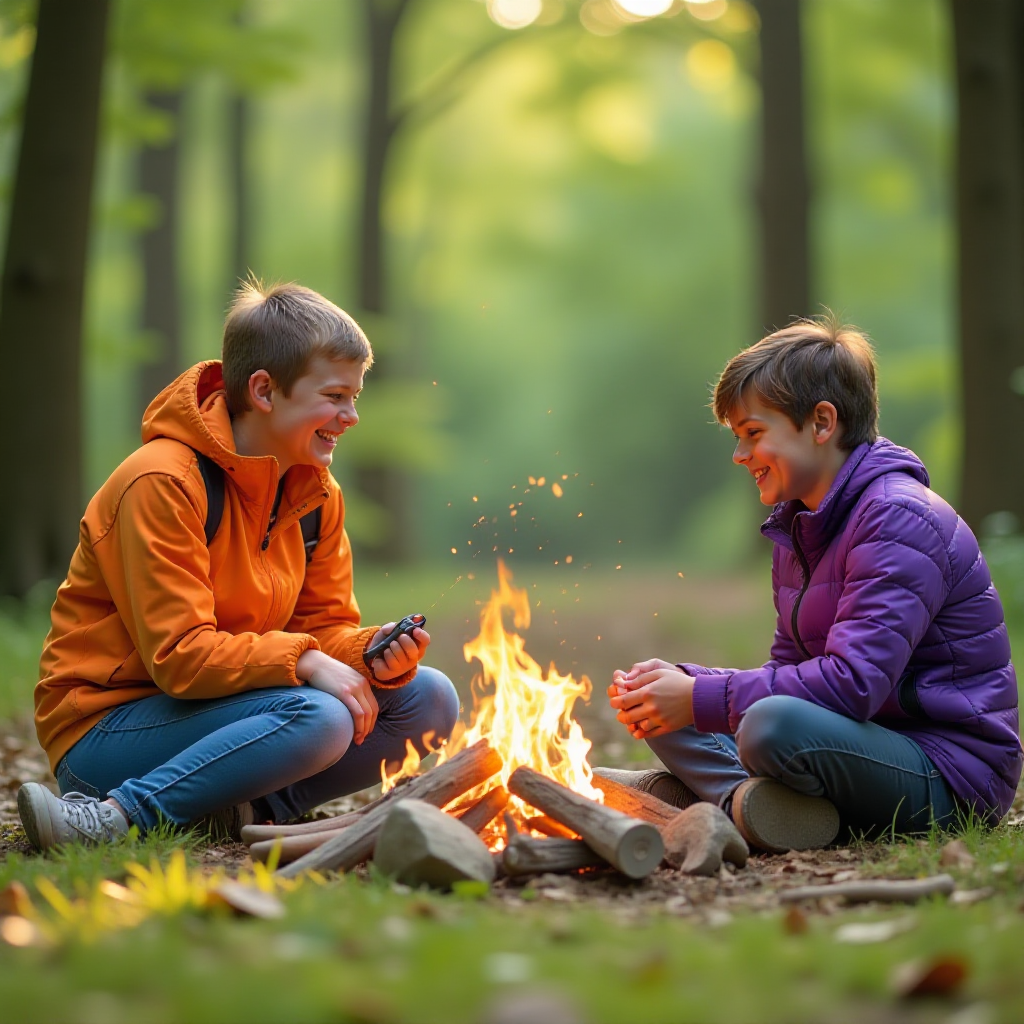
Why Camping Matters for Youth
Camping provides a unique environment where youth can disconnect from digital distractions and connect with nature, peers, and themselves. According to research, outdoor experiences like camping improve mental health, boost confidence, and enhance social skills in young people. With rising concerns about screen time and mental health challenges among youth, outdoor activities for young people offer a powerful antidote. Camping fosters growth in ways that classrooms or urban settings often cannot, making it a critical tool for youth development. This guide outlines the key benefits of camping for youth and practical ways to maximize its impact.
1. Promotes Physical and Mental Health
Camping engages youth in physical activity and nature, benefiting both body and mind.
Physical Fitness
Camping involves activities like hiking, swimming, or setting up tents, which promote physical health. These outdoor activities for young people improve cardiovascular fitness, strength, and coordination. For example, a single day of hiking can burn 300-500 calories, encouraging an active lifestyle.
How to Maximize: Incorporate structured activities like nature scavenger hunts or obstacle courses at camp. Encourage youth to try new sports, like kayaking, to make fitness fun.
Mental Health Benefits
Exposure to nature reduces stress and anxiety. Studies show that spending time outdoors lowers cortisol levels by up to 15%, promoting calm. Camping and mental health benefits include improved mood, reduced symptoms of depression, and better focus, especially for youth with ADHD.
How to Maximize: Include mindfulness activities, like guided nature meditation, during camping trips. Encourage youth to reflect on their surroundings, noting sights and sounds.
Sleep Improvement
Camping aligns sleep cycles with natural light, improving rest quality. Sleep benefits of camping help youth feel refreshed and emotionally balanced.
How to Maximize: Avoid screens at camp to maintain natural sleep rhythms. Set up tents away from artificial lights to enhance the effect.
SEO Tip: Keywords like camping and mental health and outdoor activities for young people target parents and educators seeking wellness solutions for youth.
2. Builds Life Skills and Independence
Camping teaches practical skills that foster confidence and self-reliance.
Problem-Solving and Resilience
Tasks like navigating trails or starting a campfire require critical thinking and adaptability. Facing challenges, like unexpected rain, builds resilience in youth. These experiences teach youth to overcome obstacles, a key aspect of camping and youth development.
How to Maximize: Assign youth tasks like planning a camp meal or reading a map. Allow them to make decisions, with guidance, to build problem-solving skills.
Independence and Responsibility
Camping away from home encourages youth to take responsibility for tasks like packing or cooking. Independence through camping fosters self-confidence and prepares them for adulthood.
How to Maximize: Give youth age-appropriate responsibilities, like setting up their tent or managing a group activity. Praise their efforts to boost confidence.
Leadership Skills
Group camping often involves leading activities or making group decisions. Leadership development through camping prepares youth for future roles in school or work.
How to Maximize: Rotate leadership roles, such as leading a hike or organizing a game. Offer leadership workshops at camp to formalize training.
3. Fosters Social Connections and Teamwork
Camping creates opportunities for youth to build relationships and collaborate.
Building Friendships
Shared experiences, like storytelling around a campfire, forge strong bonds. Camping and social skills help youth develop empathy and communication, reducing social anxiety.
How to Maximize: Organize group activities like team-building games or group hikes. Encourage icebreakers to help shy youth connect.
Teamwork and Cooperation
Camping tasks, like pitching tents or cooking, require collaboration. Teamwork in youth camping teaches youth to work together, respect differences, and resolve conflicts.
How to Maximize: Design activities requiring group effort, like building a shelter or scavenger hunts. Debrief after activities to discuss teamwork lessons.
Cultural Awareness
Camps often bring together diverse youth, fostering understanding of different backgrounds. Camping and cultural awareness promote inclusivity and empathy.
How to Maximize: Include cultural exchange activities, like sharing family traditions or foods, to celebrate diversity.
4. Encourages Environmental Awareness
Camping connects youth to nature, fostering a lifelong commitment to conservation.
Understanding Ecosystems
Learning about plants, animals, and ecosystems during camping instills environmental respect. Nature-based learning for kids promotes sustainability and stewardship.
How to Maximize: Include guided nature walks with experts to teach about local flora and fauna. Encourage youth to keep a nature journal to document observations.
Sustainable Practices
Camping teaches low-impact practices, like leaving no trace or conserving water. Environmental education through camping encourages eco-friendly habits.
How to Maximize: Teach principles like packing out trash or using reusable gear. Organize clean-up activities to reinforce responsibility.
Connection to Nature
Spending time outdoors fosters a sense of wonder and connection to the environment. Nature connection for youth reduces stress and inspires conservation advocacy.
How to Maximize: Plan activities like stargazing or wildlife spotting to deepen appreciation. Encourage youth to share what nature means to them.
5. Enhances Emotional and Psychological Growth
Camping nurtures emotional resilience and self-esteem.
Boosting Self-Esteem
Overcoming challenges, like hiking a tough trail, builds confidence. Camping and self-esteem help youth feel capable and accomplished.
How to Maximize: Celebrate small achievements, like completing a task or trying something new. Provide positive feedback to reinforce their efforts.
Managing Stress
Nature’s calming effect reduces stress, while camp activities teach coping skills. Camping for stress relief equips youth to handle life’s pressures.
How to Maximize: Teach simple stress management techniques, like deep breathing, during camp. Create quiet spaces for reflection.
Emotional Regulation
Camping provides a safe space to process emotions, like fear or frustration. Emotional growth through camping helps youth navigate complex feelings.
How to Maximize: Encourage open discussions around the campfire about challenges or successes. Train camp leaders in emotional support techniques.
6. Provides a Break from Technology
Camping offers a digital detox, allowing youth to focus on real-world experiences.
Reducing Screen Time
Excessive screen use is linked to anxiety and reduced attention spans. Digital detox through camping promotes mindfulness and engagement.
How to Maximize: Enforce tech-free zones or times at camp. Provide engaging alternatives, like storytelling or games, to keep youth occupied.
Enhancing Focus
Disconnecting from devices improves concentration and creativity. Camping and mental focus help youth develop better attention skills.
How to Maximize: Include activities requiring focus, like orienteering or crafting. Encourage mindfulness practices to enhance attention.
Real-World Connections
Camping prioritizes face-to-face interactions over virtual ones. Camping and social connections foster authentic relationships.
How to Maximize: Ban devices during group activities to encourage interaction. Promote activities like group singing to build camaraderie.
7. Encourages Adventure and Exploration
Camping sparks curiosity and a love for adventure.
Trying New Activities
From canoeing to rock climbing, camping introduces youth to new experiences. Adventure in youth camping builds confidence and curiosity.
How to Maximize: Offer a variety of activities, like archery or fishing, to spark interest. Ensure safety with trained instructors.
Exploring Nature
Discovering new landscapes or wildlife inspires wonder. Nature exploration for youth encourages lifelong learning.
How to Maximize: Plan hikes or guided tours to unique natural sites. Provide maps or guides to encourage exploration.
Building Courage
Facing fears, like sleeping in a tent or navigating a trail, fosters bravery. Camping and courage prepare youth for life’s challenges.
How to Maximize: Gradually introduce challenging activities, like night hikes, with support to build confidence.
8. Practical Steps for Parents and Youth Leaders
To maximize the benefits of camping for youth, consider these steps:
For Parents
- Choose the Right Camp: Select programs aligned with your child’s interests, like adventure or environmental camps. Research safety and staff qualifications.
- Prepare Together: Involve your child in packing and planning to build excitement and responsibility.
- Follow Up: Discuss their experiences after camp to reinforce lessons and address emotions.
For Youth Leaders
- Plan Diverse Activities: Include a mix of physical, creative, and educational activities to engage all youth.
- Ensure Safety: Train staff in first aid and safety protocols to build trust.
- Foster Inclusivity: Create a welcoming environment for diverse youth, addressing cultural or accessibility needs.
9. Challenges and Solutions
Camping may face barriers, but solutions ensure accessibility and impact.
Accessibility
Cost or location can limit access. Accessible camping for youth requires affordable options and outreach.
Solution: Offer scholarships or subsidized programs. Partner with schools or community groups to reach underserved youth.
Safety Concerns
Parents may worry about risks like injuries or wildlife. Safe camping for youth builds trust.
Solution: Ensure certified staff, clear safety protocols, and emergency plans. Communicate safety measures to parents.
Engagement
Some youth may feel hesitant about camping. Engaging youth in camping requires creativity.
Solution: Tailor activities to interests, like music or sports, and provide mentorship to ease anxieties.

The importance of camping for youth lies in its ability to foster physical health, mental resilience, social skills, and environmental awareness. By engaging in outdoor activities for young people, youth develop independence, teamwork, and a love for nature. Parents and leaders can maximize these youth camping advantages by choosing inclusive, safe programs and encouraging reflection. Start with a local camp or a weekend trip to spark these benefits. For further resources, explore organizations like the American Camp Association or local outdoor programs. Camping equips youth with skills and memories that last a lifetime, shaping them into confident, connected individuals.
